Little work done on upgrading refugee homes

Previous occupants of condemned refugee buildings due to be demolished as part of the government’s Ktizo plan revealed on Tuesday that not only has the process not moved ahead, but in some cases the buildings are being illegally occupied by squatters.
Philenews reported it had received a number of complaints from people who had been asked nearly a year ago to move out of their flats in refugee estates as the buildings had been deemed too dangerous and were due to be demolished and rebuilt.
In the meantime, they were relocated to temporary rental housing (paid for through a subsidy) so that new buildings could be constructed as soon as possible.
However, according to the report, many of the buildings still stand and are reportedly being occupied by squatters, with pieces of cloth covering where doors and windows used to be.
Refugees who contacted the paper protested that they had been forced to move out of their homes and told the buildings were too dangerous to live in, when they seem to have endured just fine.
“If they’d let us stay until all the demolition procedures began, we would have stayed in our apartments, without being paid rent [by the state] and without looking for the extra amount demanded by the owners of the apartments we rent,” they said.
As beneficiaries of the Ktizo plan are eligible for a rent subsidy of 24 months, many are concerned about what will happen if the process keeps dragging on.
Based on the relevant announcements, the rent subsidy amount is determined based on the type of apartment the beneficiary previously lived in – so for a one bedroom they receive €400 per month, for a two-bedroom they receive €600, and for a three-bedroom they get €800 a month.
In Limassol, where rents are higher, beneficiaries will be granted subsidies of €600 for a one-bedroom apartment, €800 for a two-bedroom apartment and €1,000 for a three-bedroom apartment.
It had been previously reported that condemned buildings that were evacuated were looted and stripped of everything from the solar panels to the counters, electrics, doors and windows.
Earlier this month, the House refugee committee called on authorities to speed up the process after hearing about the delays.
So far, three tenders have been announced concerning the demolition of two buildings in refugee estates in Aglantjia, two in Deftera, and two in Kato Polemidia.
The government is also preparing tenders for the demolition of seven buildings in the Strovolos III estate, thus completing the demolition process of the 20 apartment buildings of the first phase of the plan.
